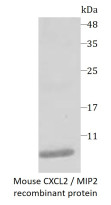ARG70436
Mouse CXCL2 / MIP2 recombinant protein (Active) (His-tagged, N-ter)
Mouse CXCL2 / MIP2 recombinant protein (Active) (His-tagged, N-ter) for SDS-PAGE
Overview
| Product Description | E. coli expressed, His-tagged (N-ter) Active Mouse CXCL2 / MIP2 recombinant protein |
|---|---|
| Tested Application | SDS-PAGE |
| Target Name | CXCL2 / MIP2 |
| Species | Mouse |
| A.A. Sequence | Ala28 - Asn110 |
| Expression System | E. coli |
| Protein Full Name | C-X-C motif chemokine 2 |
| Activity | Active |
| Activity Note | Determined by its ability to chemoattract BaF3 cells transfected with human CXCR2. The ED50 for this effect is < 0.5 ng/mL. |
| Alternate Names | CXCL2; C-X-C Motif Chemokine Ligand 2; SCYB2; CINC-2a; MIP-2a; MGSA-B; GROb; GRO2; Macrophage Inflammatory Protein 2-Alpha; Chemokine (C-X-C Motif) Ligand 2 |
Properties
| Form | Powder |
|---|---|
| Purification Note | Endotoxin level is less than 0.1 EU/µg of the protein, as determined by the LAL test. |
| Purity | > 98% (by SDS-PAGE) |
| Buffer | PBS (pH 7.4) |
| Reconstitution | It is recommended to reconstitute the lyophilized protein in sterile water to a concentration not less than 200 μg/mL and incubate the stock solution for at least 20 min at room temperature to make sure the protein is dissolved completely. |
| Storage Instruction | For long term, lyophilized protein should be stored at -20°C or -80°C. After reconstitution, aliquot and store at -20°C or -80°C for up to one month. Storage in frost free freezers is not recommended. Avoid repeated freeze/thaw cycles. Suggest spin the vial prior to opening. |
| Note | For laboratory research only, not for drug, diagnostic or other use. |
Bioinformation
| Gene Symbol | CXCL2 |
|---|---|
| Gene Full Name | C-X-C Motif Chemokine Ligand 2 |
| Background | This antimicrobial gene is part of a chemokine superfamily that encodes secreted proteins involved in immunoregulatory and inflammatory processes. The superfamily is divided into four subfamilies based on the arrangement of the N-terminal cysteine residues of the mature peptide. This chemokine, a member of the CXC subfamily, is expressed at sites of inflammation and may suppress hematopoietic progenitor cell proliferation. |
| Function | Produced by activated monocytes and neutrophils and expressed at sites of inflammation. Hematoregulatory chemokine, which, in vitro, suppresses hematopoietic progenitor cell proliferation. GRO-beta(5-73) shows a highly enhanced hematopoietic activity. |
| Cellular Localization | Secreted |
| PTM | Disulfide bond |
Images (1) Click the Picture to Zoom In






